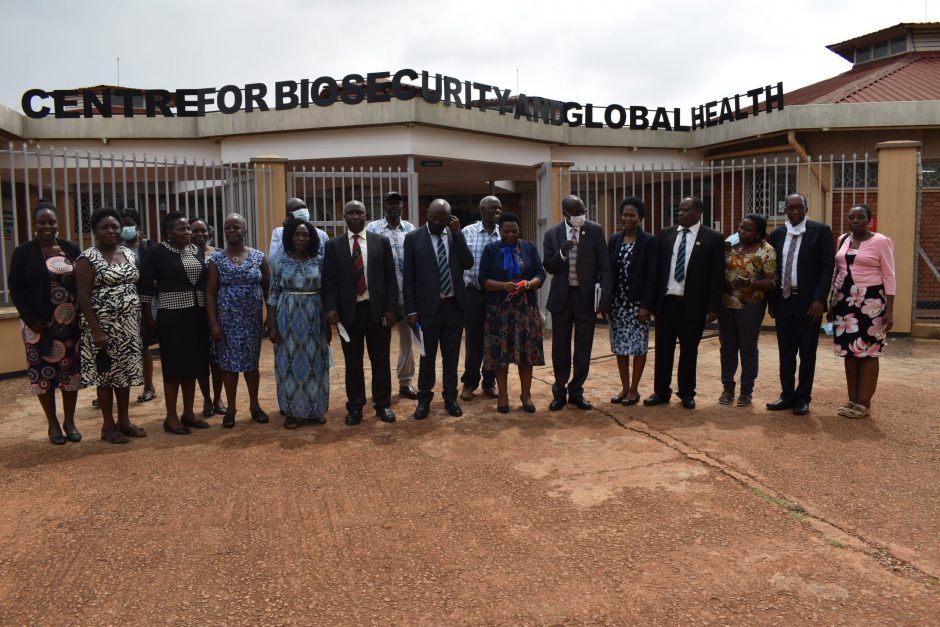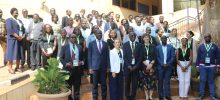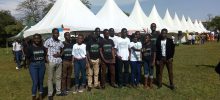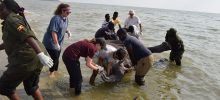Assoc. Prof. Lawrence Mugisha hailed for spearheading Animal Ethics in Research and Teaching.
Assoc. Prof. Lawrence Mugisha from the College of Veterinary Medicine, Animal Resources and Bio Security (CoVAB) has been commended for taking a lead role in the development of the National Guidelines for use of animals in research and teaching and the establishment of the Institutional Animal Care and Use Committee (IACUC).
This was during a workshop held at CoVAB on 9th March 2022 to launch accreditation process of the School of Veterinary and Animal Resources (SVAR) Institutional Animal Care and use Committee (SVAR IACUC).
Associate Prof Lawrence Mugisha who is the current Chairperson of the Institutional Animal care and use committee (IACUC) said the process of establishing the committee started in 2017 and that the guidelines provided that for it to be accredited, it must have a fully constituted and trained membership, with a well-established secretariat in a functional office run by a full time administrator.

Associate Prof Lawrence Mugisha.
He said the purpose of the forum was to review the present form of the Institutional Animal care and use committee (IACUC), the standard operating procedures (SOPS) in preparation for accreditation that was due in April 2022.
While giving reference to the Animal Cruelty Act 1957, which was operating without guidelines, Prof. Mugisha noted that these were established to promote the welfare of animals and promote proper use of animals in research and teaching. “Our national regulation for use of animal in research and teaching is in line with several international regulations and guidelines. For example, World Organisation for Animal Health (OIE), The Council for International Organisation for Medical Sciences (CIOMS) and The International Council Laboratory Animal Sciences (ICLAS) which states that animals should be used only when necessary and only when their use is scientifically and ethically justified.
He said the principles of the 3Rs-Replacement, Reduction and Refinement should be incorporated into the design and conduct of scientific and or educational activities that involve animals. In addition, animals selected for the research should be suitable for the purpose and of an appropriate species and genetic background to ensure scientific validity and reproducibility, he explained.

Prof. Henry Mwanaki Alinaitwe, Ag. Deputy Vice Chancellor Finance and Administration
The Vice Chancellor Makerere University Prof. Barnabas Nawangwe who was represented at the event by Prof. Henry Mwanaki Alinaitwe, Ag. Deputy Vice Chancellor Finance and Administration congratulated CoVAB for the initiative. He said as a research led University, it was imperative that the guidelines were in place and called upon the Uganda National Council for Science and Technology to regularly make consultations with Makerere University bearing on its mantra of being research centred. He commended the leadership of CoVAB for making good use of the MAK RIF funds part of which supported the process through the study entitled; Strengthening Institutional Capacity for Ethical conduct of Research involving Animals (ICEcoRIA).
The Assistant Executive Secretary, Uganda National Council for Science and Technology (UNCST) Ms. Hellen Opolot has hailed Prof. Mugisha who as the Chairperson was instrumental in leading a multidisciplinary group of members to design The National Guidelines for Use of Animals in research and teaching. She said the Uganda National Council for Science and Technology (UNCST) launched the guidelines on the 16th of September 2021, an event presided over by the Minister Hon. Frank Tumwebaze, Ministry of Agriculture, Animal Industry and Fisheries. She said the guidelines now provide a framework for scientists, institutional animal care and use Committees, facility managers, sponsors, funders ,teaching institutions and animal care staff to consider while planning to use animals in research and teaching’ explained Miss Opolot of UNCST.

Ms. Hellen Opolot Assistant Executive Secretary, Uganda National Council for Science and Technology.
For national regulatory oversight in the use of animals in research and teaching, Miss Opolot noted that UNCST has powers to accredit specialized committees and research councils and that section 3 of The National Guidelines for Use of Animals in research and teaching Act stipulates that IACUCs are established by institutions owning and caring for animals used for purposes of research and teaching. She highlighted the key requirements for the establishment of IACUCs that included appointment of the IACUC members and IACUC administrator by the head of the institution or his/her designee. Other requirements include well established operational offices and board meeting space, well written Standard Operating Procedures (SOPs) and assurance of financing mechanism for the committee.
Prof. Norbert Frank Mwiine the College Principal extended his appreciation to Uganda National Council for Science and Technology for partnering with Makerere University to promote quality research and animal use. He equally thanked Prof Mugisha for his leadership in research and the promotion of animal ethics nationally and internationally. He highlighted the importance of Institutional Animal Care and Use Committee and established National guidelines in promoting the quality research and harmonized animal use in line with international standards.
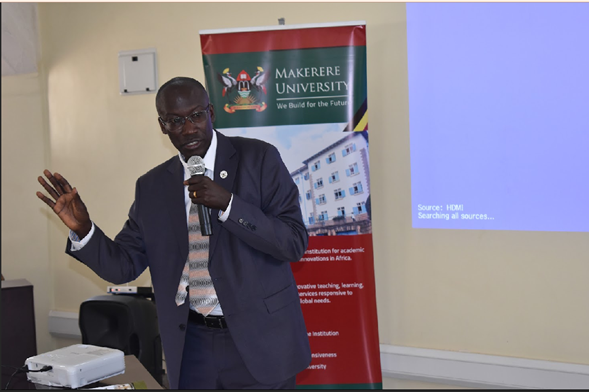
Prof. Frank Mwiine Principal COVAB
He implored staff in the college to acquit themselves with provisions of the guidelines and operations of the IACUC in order to follow the due process of protocol to obtain all approvals required to undertake research using animals. He pledged commitment towards supporting the operations of committee in the college and the university as a whole.
Prof. Robert Tweyongyere, Dean of School of Veterinary Medicine and Animal Resources (SVAR) stressed the importance of regulation in the use of animals in research and teaching adding that the guidelines were necessary and timely for practice purposes. “I would like to thank Uganda National Council for Science and Technology for embracing the idea of having an animal research and teaching committee and taking it forward to national level’. Prof. Tweyongyere commended the Makerere University Research and Innovation Fund (MakRIF) for funding animal research and teaching at the School of Veterinary Medicine and Animal Resources.
The Workshop attracted over 30 participants from government institutions, academia and regulatory agencies among others. The guidelines for animal research and teaching can be accessed on www.uncst.org
Written by Harriet Musinguzi and Odoi Joseph.


